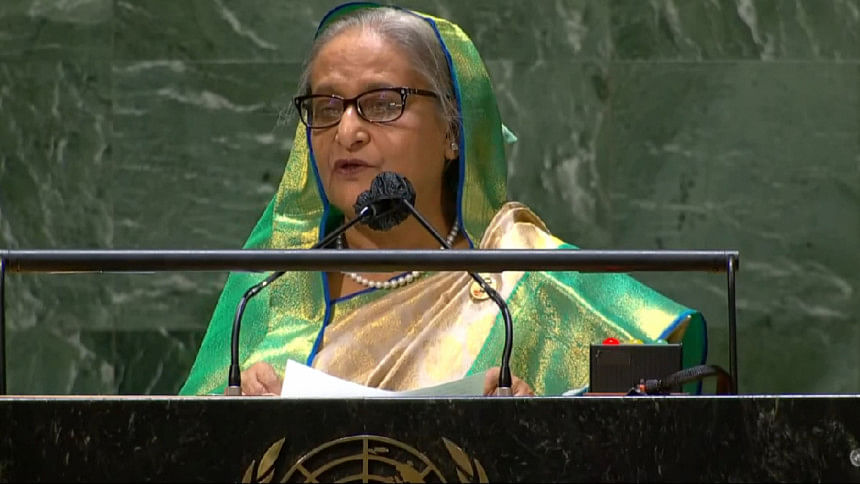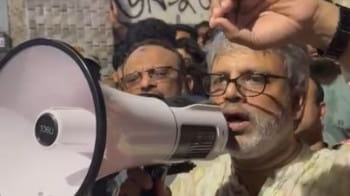PM’s UNGA speech: Hasina places six proposals before world to fight Covid

Terming Covid-19 a common enemy, Prime Minister Sheikh Hasina has placed six proposals before the global leaders to fight the deadly virus with fresh, inclusive and effective ideas.
"Sadly though, this malaise [Covid-19] seems to be here for a while, and therefore, as we had in the past, must come forth with fresh, inclusive, and global ideas to fight this common enemy. Let me highlight a few specific issues in this regard," she said.
The Prime Minister said this while delivering her speech in the UN General Assembly (UNGA) debate at the UN Headquarters today.
ADDRESS VACCINE INEQUALITY
In her first proposal, Hasina said for a Covid-free world, "We must ensure universal and affordable access to vaccines for people across the world."
Hasina said in the last UNGA she had called for treating Covid-19 vaccines as a "global public good". This was echoed by many other leaders. "Yet these calls remain largely unheeded. Instead, we've seen growing 'vaccines divides' between the rich and the poor nations."
According to the World Bank, she said, 84 percent of vaccine doses have so far gone to people in high and upper middle-income countries, while the low-income countries received less than 1 percent.
"This vaccine inequality must be urgently addressed. We cannot chart out a sustainable recovery and be safe by leaving millions behind," she said.
She also said immediate transfer of vaccine technologies could be a means to ensure vaccine equity. Bangladesh is ready to produce vaccines in mass scale if technical know-how is shared with the country and patent waiver is granted, she said.
COVID'S DISPROPORTIONATE IMPACTS
In the second proposal, she said the pandemic has disproportionately impacted the climate vulnerable countries. "Unless there are immediate measures, the devastating impacts of climate change will be irreversible. No country, rich or poor, is immune to the destructive effects. We, therefore, call upon the rich and industrialised countries to cut emissions, compensate for the loss and damage, and ensure adequate financing and technology transfer for adaptation and resilience building."
She said as chair of the Climate Vulnerable Forum and the Vulnerable Twenty Group of Ministers of Finance, Bangladesh has launched the "Mujib Climate Prosperity Plan – Decade 2030" outlining a transformative agenda from climate vulnerability to climate prosperity.
She said the upcoming COP-26 Summit in Glasgow provides a good opportunity to rally support for such new and inclusive ideas. "Let us not miss out on this opportunity."
EDUCATION RECOVERY
In her third point, Hasina said the pandemic has severely disrupted the education system and millions of students in low-income countries did not have the resources and technologies to join remote learning facilities, jeopardising decades of gains in enrolment and literacy rates.
"We need a global plan to prioritise education recovery by investing in digital tools and services, access to the internet, and capacity building of teachers. We also call upon the UN system to rally partnership and resources to make that happen."
LOOKING FOR MORE SUPPORT
Hasina said Bangladesh is on track to graduate from the LDC category despite the unprecedented challenges posed by the Covid-19 pandemic. The Covid-19 pandemic, however, has put at risk the graduation prospect and aspiration of many countries.
"To motivate and incentivise sustainable graduation, we look forward to receiving more support from our development partners for an incentive-based graduation structure."
As one of the co-chairs of the Preparatory Committee of the LDC 5 Conference, she said, "We expect concrete outcome of Doha conference enabling more countries to sustainably graduate out of the LDC category."
TREAT MIGRANTS FAIRLY
In the fifth proposal, the prime minister said migrants have been the frontline contributors during the pandemic as essential workers in the health and other emergency services. Yet many of them have been particularly hard-hit due to loss of jobs, salary cuts, lack of access to health and other social services, and forcible return.
ROHINGYA CRISIS
In her last proposal, the PM said the Rohingya crisis is in its fifth year now. Yet not a single forcibly displaced Myanmar national could be repatriated to Myanmar.
"Despite the uncertainty created by the recent political developments in Myanmar, we expect enhanced focus and active support of the international community to find a durable solution to this crisis."
She said Myanmar must create the conditions conducive for their return. "We are ready to work with the international community on this compelling priority."
She also said from Bangladesh's part, to ensure their temporary stay in Bangladesh, it has relocated some of the forcibly displaced Myanmar nationals to Bhasan Char.
"We have also included all eligible from them in the national vaccination drive to curb the spread of Covid-19 in the camps. I would like to reiterate that the crisis was created in Myanmar and its solution lies in Myanmar."
She said the International community must work constructively for a permanent solution of the crisis through safe, sustainable, and dignified return of the Rohingyas to their home in Rakhine State.
"While we expect the ASEAN leadership to step up their ongoing efforts, the international community needs to support all the accountability processes."
Sheikh Hasina also said she envisions a peaceful, stable, and prosperous South Asia. "We firmly believe that it is upon the people of Afghanistan to rebuild their country and decide the course of the future themselves. Bangladesh stands ready to continue to work with the people of Afghanistan and the international community for its socioeconomic development."
She said peace remains a preeminent focus of Bangladesh's foreign policy. As a proponent of the flagship resolution of Culture of Peace, Bangladesh remains deeply committed to creating a peaceful society.
"The menace of terrorism and violent extremism are jeopardising peace and security in many parts of the world. Therefore, we maintain a 'zero tolerance policy' towards these menaces."
Talking about peacekeeping missions of Bangladesh she said, despite unprecedented challenges of the pandemic, the peacekeepers are serving in some of the most difficult circumstances across the globe with utmost dedication and professionalism.
She said the international community must do everything possible to ensure their safety and security.
About the disarmament issue, she said as per the constitutional obligation, Bangladesh has always been a steadfast supporter of complete disarmament.
"We firmly believe that the ultimate guarantee of international peace and security lies in the total elimination of nuclear weapons and other weapons of mass destruction. It was from that conviction we ratified the Treaty on the Prohibition of Nuclear Weapons (TPNW), which entered into force earlier this year."
The prime minister said Covid-19 has brought to the fore the inadequacy of the global response to tackle emergencies. It has also put a spotlight on the critical need for global solidarity and collaboration to effective Covid-19 response.
"We must demonstrate our ability to work and act together on global common issues and create space for new partnerships and solutions. And that must start right here at the UN; with the member states; across regions; rising above narrow political interests. At this critical juncture, the United Nations stands as our best hope," she said.
Permanent Representative of Bangladesh to the United Nations Rabab Fatima presided over the UN general debate when Prime Minister Sheikh Hasina addressed it.

 For all latest news, follow The Daily Star's Google News channel.
For all latest news, follow The Daily Star's Google News channel. 



Comments